Organic Protein Powder: What Is It & Its Benefits?
Author:
Unlock your full potential by engaging with our experts and community! Have questions about your fitness journey or looking for expert advice on weightlifting techniques? Don’t hesitate — leave a comment below and Oleksandr Maksymenko will provide a personalized answer and insights to help you reach your goals.
Torokhtiy is reader-supported. Some links are affiliate links, and we may earn a commission at no extra cost to you. See our disclosure page for details.
If you’re into fitness at all, protein powder is most likely a staple in your diet. But do you use the organic kind? If not, have you ever considered it?
Organic protein powder is made from ingredients that are grown without synthetic pesticides, herbicides, or fertilizers. This means you get a cleaner, more natural product. If you’ve never thought of going the organic route and you’re not even sure what an organic protein powder is, stick around because we have all the answers.
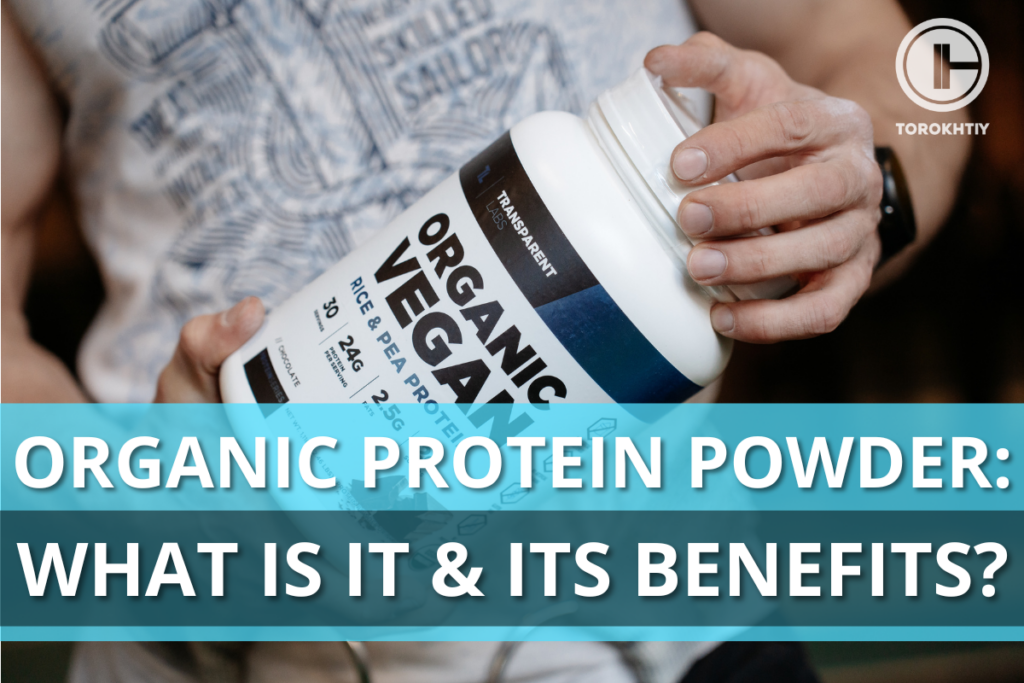
What is Organic Protein Powder?
Organic can be a confusing term because there is often no set-definition of what it actually means. When it comes to foods being labeled as organic, according to the USDA, a checklist for organic food products would look something like this.
Organic foods were produced without:
- Antibiotics
- Growth Hormones
- Conventional Pesticides
- Synthetic Fertilizers
- Bioengineering
- Ionizing Radiation
So, organic protein powder is essentially any protein powder where none of the ingredients used were produced using any of the non-organic techniques listed above.
With most dairy cows being given antibiotics and growth hormones, and most crops grown getting some form of pesticide or bioengineering, it can be quite difficult to find completely organic proteins.
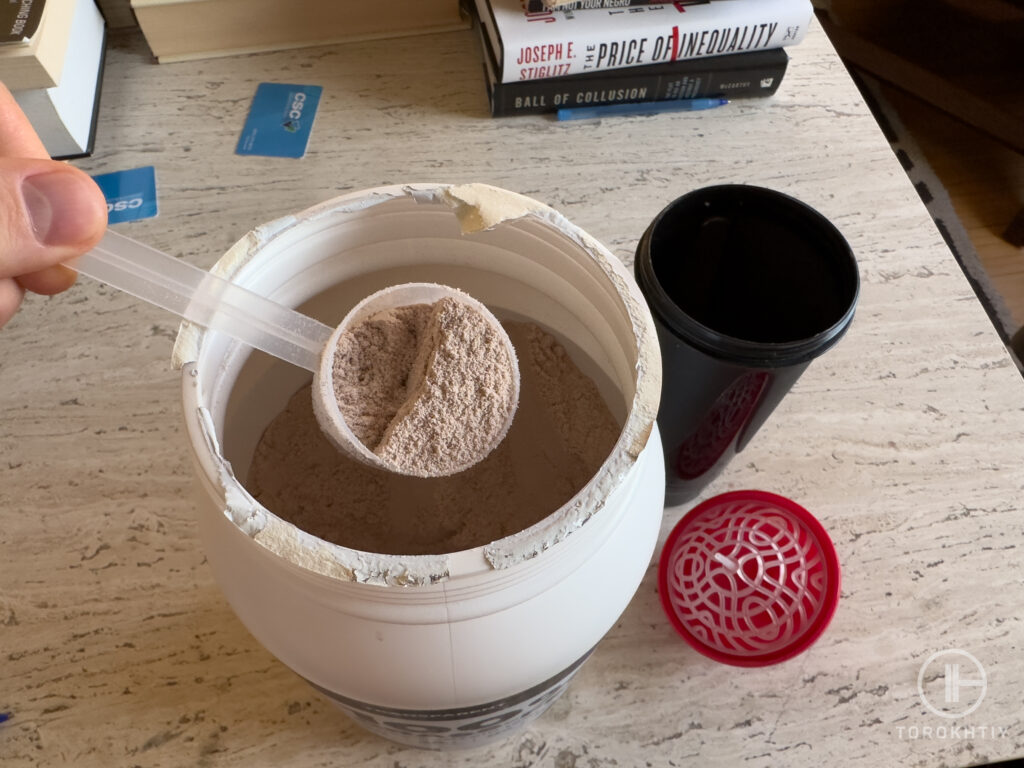
What Could Be the Sources of Organic Protein?
1. Plant-Based Blends
The most common proteins you will see being branded as organic are plant-based blends. They are commonly made up of a combination of pea or brown rice protein, and may contain additional protein sources from seeds or sprouts for example.
It’s likely more common to find organic plant-based protein because there is more demand for organic products from people who follow plant-based diets in the first place.
2. Whey
There are also organic whey supplements out there if you’re specifically looking for this instead of a plant-based protein powder. Keep in mind that these are much rarer to find because there is likely less demand for fully organic dairy products.
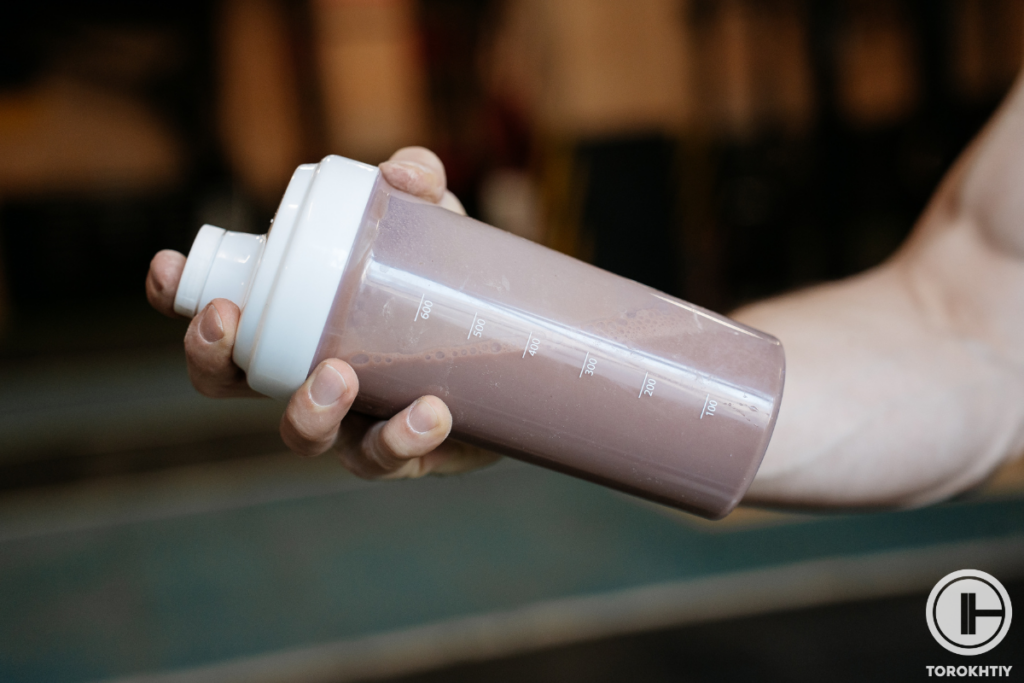
What Are the Benefits of Organic Protein Powder?
The main benefit of buying organic protein is that you can be confident the ingredients used in the product are not being made with any of the potentially harmful food production techniques listed above.
If you’re concerned with the potentially negative effects of any of these farming practices, then you may see organic products as being the safest protein powder options available.
Supplement companies are notorious for using low-quality ingredients to make a better profit. Although organic proteins will likely cost more money, you can at least be confident you’re getting high quality ingredients.
Another pro to buying organic protein is the possibility of higher nutrient content in the ingredients being used. Studies have shown that organic produce often has a small to moderate increase in the overall nutrition profile.
Because these differences are minor, this won’t be a major reason to switch to a completely organic diet, but it is a nice benefit to keep in mind.
The Difference Between Organic and Non-organic Protein
The main difference between organic and non-organic protein is that with organic products, none of the ingredients were produced using farming techniques such as pesticides, synthetic fertilizers, etc.
Although the health benefits of this could be debated, it does appear organic ingredients are generally healthier and slightly more nutritious than non-ingredients. In general, organic protein powders will have higher quality ingredients overall.
This brings us to the only other major difference, which is the cost. Because organic ingredients are more expensive, supplement companies tend to charge more for organic products. Although there are still some solid budget-friendly options out there, on average, organic protein powder is significantly more expensive.
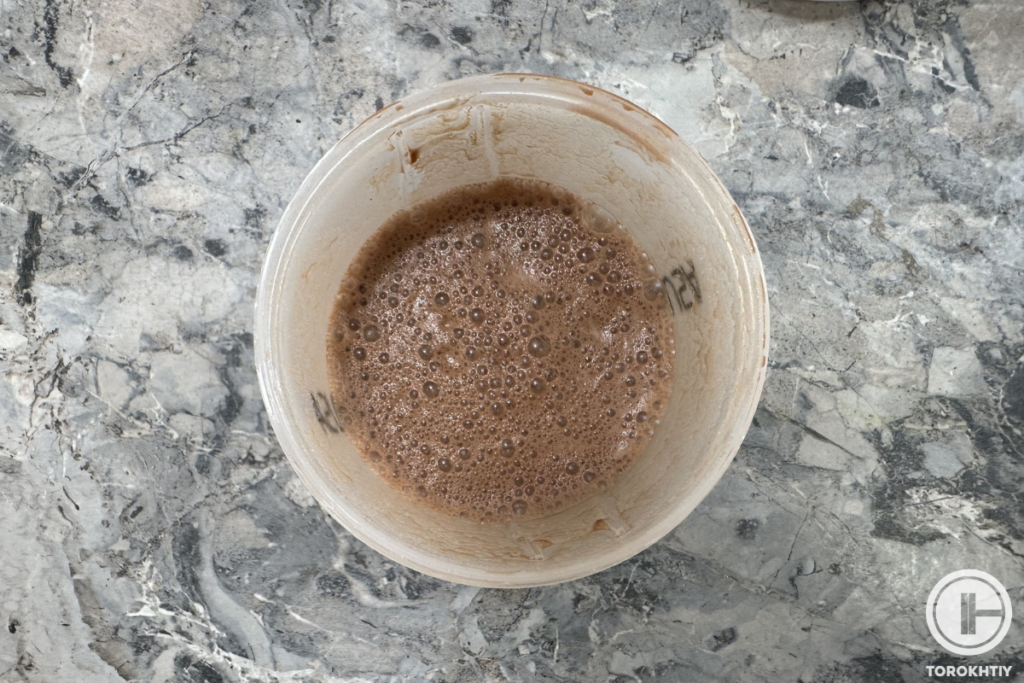
Is It Worth It to Pay More for Organic?
Unfortunately, because organic ingredients are not the norm, it can be more expensive for supplement companies to source completely organic ingredients for their formulas. This naturally leads to organic protein powders being more expensive than their non-organic counterparts.
Whether or not these higher prices are worth it will come down to how concerned you are about the potential health risks of non-organic foods and pesticide exposure.
It’s worth noting that while organic proteins will likely cost slightly more, be wary of companies charging ridiculously high prices for a protein just because it’s organic.
It’s entirely possible to have a high quality, organic protein for under ~$1.50 per serving. It is ultimately up to you to decide how much of a premium you’re willing to pay for organic protein.
How to Find the Best Organic Protein Powder?
1. Ingredients List
First and foremost, if you’re looking to buy organic foods, you’re likely concerned about exactly what ingredients you’ll be consuming. To find the organic protein powder that’s right for you, always take a close look at the ingredients list to make sure the product a) has ingredients you want to consume, and b) doesn’t contain ingredients you’re looking to avoid.
For example, many of the products on our list have “superfood” blends of various fruits and veggies. If you’re looking to get some extra micronutrients in with your protein, then these would be great options!
On the other hand, some of the products have artificial sweeteners like erythritol, and if this is something you’re not comfortable consuming, then consider avoiding those products.
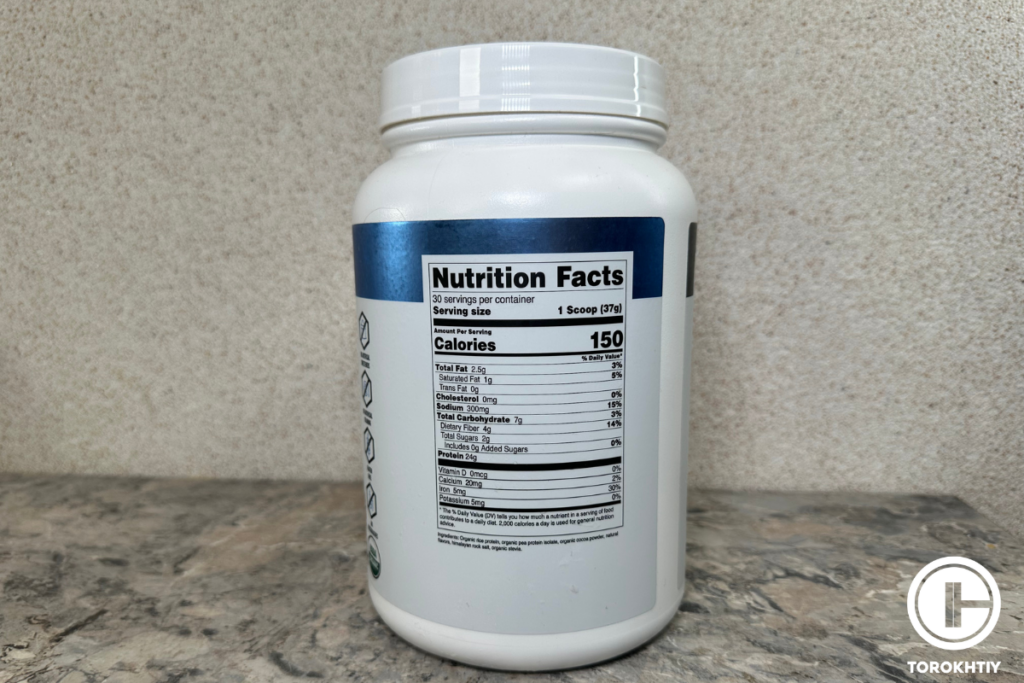
2. Protein Content and Calorie Count
When buying a protein powder, the main macronutrient you should be concerned with is protein. Depending on your goals, you may not need a supplement with much more than 20g of protein. However, if you’re looking to gain mass, or maintain muscle on a cut, getting a high amount of protein in your diet is important.
Be sure to check how much protein a product has in each serving, and compare it with other supplements to see how it stacks up.
The same rule applies for calories per serving. This is arguably even more important depending on your goals. If you’re looking to bulk up, you’ll want a protein with a good amount of calories in each serving. However, if you’re trying to lose weight, each calorie counts. Be sure whatever protein you’re buying fits closely in line with your goals.
3. Value for Money
Of course, you want to make sure you’re getting a good bang for your buck, especially when buying a premium product like organic protein. Making sure that the ingredients list, calorie count, and protein content are in line with your goals is important, but your final decision should always come down to whether or not the product is affordable.
Be sure that you’re not being upsold too much for that “organic” label, and make sure you’re still getting a quality product.
Transparent Labs Rice & Pea Protein
- Diet Type: Building Muscle, Improving Recovery, Cutting
- Suitable for Vegans: Yes
- Protein Source: Organic Rice protein & Organic Pea Protein Isolate
- Serving Size: 32.05g
- Price per Serving: ~$1.67
- Protein Percent of Calories: 74%
- Calories: 130
- Protein: 24g
- Carbohydrates: 3g
- Fat: 2g
- Sugar: 2g
- Company Founded: 2015
- Recommended by Athletes: Hafthor Bjornsson, Paul Sklar, Sean Harris
As you can expect with Transparent Labs, this product has no artificial ingredients whatsoever, and is made with all organic ingredients.
At ~$1.67 per serving, Transparent Labs also falls around the middle range of our list in terms of price. Although it may seem somewhat expensive, for an organic protein, a higher price is fairly standard.
Transparent Labs offers 2 flavors, French Vanilla and Chocolate. Both sweetened with organic stevia, this is some of the best tasting organic protein powder out there.
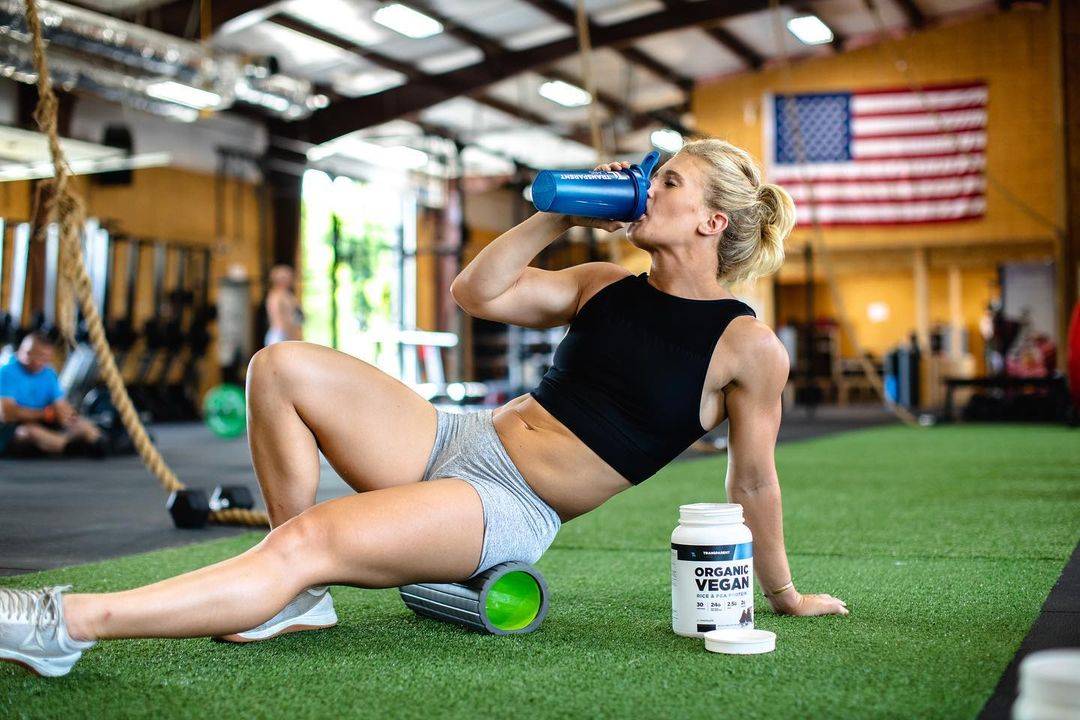
One unique thing about Transparent Labs is that they back up all their claims with scientific studies, so you know you’re getting a genuinely high quality product. For example, pea protein is a great source of isoflavones which support a healthy cardiovascular system.
FAQ
Is Organic Protein Powder Better for You?
Studies do appear to show that organic produce has significantly less pesticide residue, and slightly better nutrient content than non-organic produce. Ultimately, it is up for debate as to whether or not organic foods are significantly better for you.
With that being said, if you are concerned about the health risks associated with things like pesticides, then there is no harm in opting for more organic choices.
Is Organic Protein Just as Good as Whey?
In terms of organic plant-based protein vs. non-organic whey, both products have their own pros and cons. In terms of micronutrient content and overall health benefits, we would side with organic plant-based supplements.
However, when it comes to cost and protein content, whey is likely a better choice. Luckily, there are some organic whey supplements out there so you can get the best of both worlds.
Is Organic Protein Powder Worth It?
This is ultimately a matter of personal preference. If you follow a strictly organic diet, then you will likely be willing to pay more for fully organic protein powder. However, there’s no reason to break the bank to buy organic protein powder, as there are plenty of great options out there in the ~$1.00-1.50 per serving price range.
Conclusion
If you choose an organic protein powder, it can offer a lot of benefits for both your health and for the environment. When you go for products that are made from ingredients grown without synthetic chemicals, you reduce your exposure to potentially harmful substances.
Organic protein powders usually come from high-quality sources, which means they’re a clean way to support the growth and recovery of your muscles.
If you’re in the market for an organic protein powders, we suggest Transparent Labs Rice & Pea Protein for its simple formula and great macros.
Do you use protein powders, and if you do, what kind? Have you tired the one we recommend?
Leave a comment and let us know what you think!
Also read:
- Best Casein Protein for Weight Loss
- What Is Condsidered Low Carb Protein Powder
- How To Pick The Cleanest Protein Powder
- Best Cheap Protein Powder
- Do Protein Shakes Make You Poop
References:
- Anti-oxidant, anti-inflammatory and immunomodulating properties of an enzymatic protein hydrolysate from yellow field pea seeds // NCBI: https://pubmed.ncbi.nlm.nih.gov/ 21442413/
- The benefits of probiotics bacteria // Harvard: https://www.health.harvard.edu /staying-healthy/the-benefits-of-probiotics
- Prebiotic diet // Monash: https://www.monash.edu /medicine/ccs /gastroenterology /prebiotic/faq
- Real-time Science: Sweeteners // MSU: https://www.canr.msu.edu /news/real-time-science-sweeteners
- LOW FODMAP DIET // Gastroconsa: https://www.gastroconsa.com /patient-education/irritable-bowel-syndrome/low-fodmap-diet/
- Grass-fed cows produce healthier milk // UMN: https://extension.umn.edu /pasture-based-dairy/grass-fed-cows-produce-healthier-milk
- Nutrition and healthy eating // Mayoclinic: https://www.mayoclinic.org /healthy-lifestyle/nutrition-and-healthy-eating/in-depth/organic-food/art-20043880
- Photos made by Torokhtiy Media Team.
Why Trust Us?
With over 20 years in Olympic weightlifting, strength training, nutrition coaching, and general fitness our team does its best to provide the audience with ultimate support and meet the needs and requirements of advanced athletes and professional lifters, as well as people who strive to open new opportunities and develop their physical capabilities with us.
By trusting the recommendations of our certified experts in coaching, nutrition, and sports training programming, as well as scientific consultants, and physiotherapists, we provide you with thorough, well-considered, and scientifically proven content. All the information given in the articles concerning workout programming, separate exercises, and athletic performance, in general, is based on verified data.
The product testing process is described in more detail here.
Author: Oleksandr Maksymenko
Certified Sports Nutritionist,
MSc Sports Dietetics
Specializing in: Weight management, Fitness / Sports nutrition
Oleksandr is a professional fitness nutritionist certified by the Fitness Professional Association (FPA). He follows the principles of evidence-based dietetics and fosters a healthy relationship with food in his clients, ensuring there are no strict prohibitions on their favorite foods or frequent lapses. His primary goal is not only to achieve results for you but also to sustain them over the long term, all while enjoying tasty and delicious food.




Still have questions after reading our article? Unlock your full potential by engaging with our experts and community! Don’t hesitate — leave a comment below and Oleksandr Maksymenko will provide a personalized answer and insights to help you reach your goals.